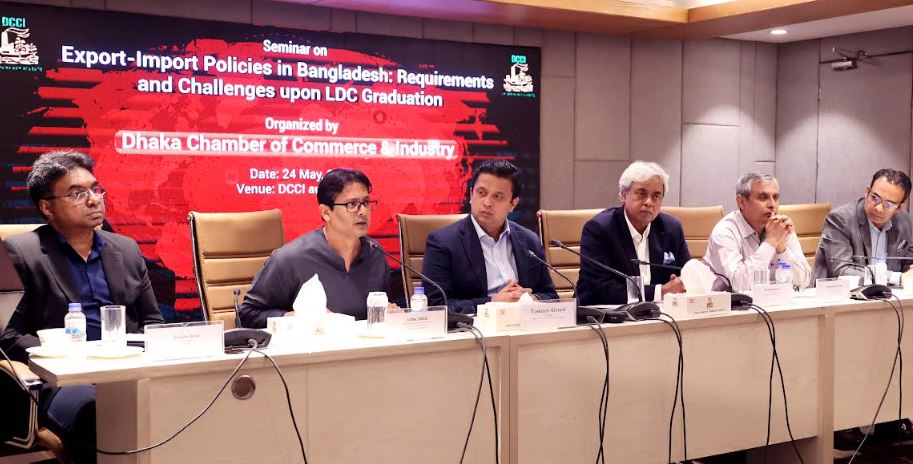News Flash

DHAKA, May 24, 2025 (BSS) - Speakers at a seminar today said that export-import policy reform is key to resilience and long-term competitiveness while re-assessing such policies is necessary to meet the challenges of post-LDC period.
The speakers said this at a seminar on “Export-import policies in Bangladesh: Requirements and Challenges upon LDC Graduation” at the auditorium of Dhaka Chamber of Commerce and Industries (DCCI) here.
Speaking as the chief guest, Lutfey Siddiqi, Special Envoy to the Chief Adviser on International Affairs, said that structural and institutional reforms among the government agencies are also necessary, and the pace of doing the reforms needs to be faster.
He said, “We don’t have any roadmap in the industrial sector not even in other sectors as well. But, there should be a roadmap for national tariff policy,” he added.
Lutfey also opined that institutionalizing and government readiness are the master-key of development.
He added that ports are the heart of the economy, so it is important to ensure logistics and keep their management running and operating smoothly.
He said that as a part of the civil society, the business community has its own power and suggested the community to present their logical demands to the government firmly to achieve since the private sector is the main driving force of the country's economy.
Speaking as special guest, Dr. Anisuzzaman Chowdhury, Special Assistant to the Chief Adviser said Bangladesh has to graduate from the LDC status while there is no option to come back.
“But, we have to focus on producing high-value ready-made garment, medicine and light engineering items to meet the post-LDC challenges,” he added.
He said a national dialogue will be held soon with the participation of all stakeholders to chalk out the next course of action for the post-LDC era.
Dr Anisuzzaman also said, “We have human capital, financial capital and physical capital and now we just need to build trust,”
He stressed on integration and coherence of policies for boosting the economy.
Md. Anwar Hossain, Vice-Chairman, Export Promotion Bureau (EPB), said effective policy support rather than cash incentives will be the key to meet the challenges of post-LDC era.
He said the government is working on three important issues - trade policy reforms, compliance and standard, and private sector preparedness. He also urged the private sector to come forward to use man-made fiber in the ready-made garment sector.
Anwar later said that if the private sector gets proper infrastructure, energy security, credit facility, policy support and logistics services, it is possible to earn $100 billion from the readymade garment sector in the next 2-3 years.
Kazi Mostafizur Rahman, Member (Customs: Audit, Modernization & International Trade), NBR said that after 1993, NBR has been implementing ASYCUDA and various other automated systems to ensure the services are transparent.
He also said that after post-LDC era, in various negotiation processes, there should be private sector participation.
He later informed that an initiative has been taken to start a central bonded warehouse and hoped that this facility could be provided to all by next July.
He urged all businessmen to avail the facility of national single window. “NBR has taken an initiative to introduce electronic data exchange system, which will allow traders to smoother export, import services.”
Making the key-note presentation, Dr. Selim Raihan, Professor of Economics, Dhaka University & Executive Director, SANEM said customs duties and tariff rates in Bangladesh are higher compared to neighboring countries.
Moreover, the country has still high dependence on import taxes. Lack of reform in the taxation sector and the government’s inability to raise taxes through direct taxation resulted in high dependence on indirect taxes and import taxes.
In terms of export policy, Selim said Bangladesh relies heavily on cash incentives and duty drawbacks to support narrowly focused RMG-dominated export base, with limited diversification, low flow of FDI and trade facilitation challenges.
On the other hand, he said in the context of import policy, Bangladesh maintains higher tariffs, non-tariffs and complex para-tariffs compared to its peers, with manual customs and import-substitute protectionist tendencies in some sectors.
Keeping all these in mind, he however suggested for establishing a unified trade policy framework, dynamic tariff adjustments, enhanced policy coordination and stakeholder engagement.
Giving the welcome address, DCCI President Taskeen Ahmed said Bangladesh’s export sector, heavily concentrated on ready-made garment industry, as a major engine of economic growth, is contributing over 84% of total export earnings.
Other sectors like pharmaceuticals, leather, jute, agro-processed goods, automobile industry and ICT are not gaining traction likewise the RMG sector.
In the export basket, he said the overall export base remains narrow and mostly dependent on a few markets. Taskeen also suggested for policy and financial support for the potential non-RMG sectors.
Moreover, he stressed on adopting a balanced and predictable tariff policy to facilitate import of raw materials and capital goods. To avoid mismatch of export and import policy, a comprehensive trade policy is essential as this practice sustains in other neighboring economies, he opined.
Md. Fazlul Haque, former President, BKMEA, Syed Almas Kabir, former President, BASIS,
Dr. Md. Zakir Hossain, Managing Director, Delta Pharma Ltd., Fakir Kamruzzaman Nahid, Managing Director, Fakir Fashion Ltd. spoke on the occasion as the panelists.
Meanwhile, former DCCI Directors A.K.D. Khair Mohammad Khan, M. Bashir Ullah Bhuiyan, and Joint Convenor Salahuddin Yusuf, among others, participated in the open discussion.
Senior Vice-President of DCCI, Razeev H. Chowdhury, Vice-President Md. Salim Sulaiman, members of the Board of Directors, and stakeholders from both public and private sectors were present at the event.